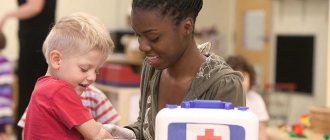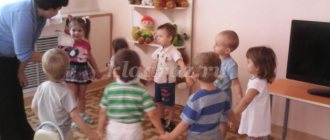Organization of joint work between a teacher-psychologist and a speech therapist in a preschool institution
Vera Reznikova
Organization of joint work between a teacher-psychologist and a speech therapist in a preschool institution
In our kindergarten, much attention is paid to correctional and developmental work with children who have various disabilities in the cognitive and speech spheres, the number of which is increasing every year. Speech correction is carried out by therapist teacher , but to make this work more effective, other specialists should be involved in this process. Who else but an educational psychologist can become a worthy partner in overcoming speech disorders in children of speech pathologists.
the complementarity of the positions of a teacher-psychologist and a teacher-speech therapist in the approach to a child , close cooperation in all areas of work as a necessary condition for ensuring effective work on the full development of the child’s personality, preserving and strengthening his physical, mental and moral health. The objectives of speech therapy work are reduced to social adaptation and integration of a child with a speech disorder into the environment of normally developing peers. Successful implementation of these goals is possible only with close interaction between these specialists in development (correction)
speech and non-speech mental processes and functions.
A speech therapist and a psychologist pursue different goals in their work , but the ways and means of achieving them quite often turn out to be common. It must be taken into account that there is always a group of children who equally need the help of both specialists.
Planning and implementation of correctional and developmental interventions requires the interaction of a speech therapist and a psychologist in cases where the following problems underlie the difficulties of teaching and raising a child:
• unformed HMF is combined with insufficient speech development;
• speech impairment is accompanied by maladaptive anxiety;
• speech underdevelopment is accompanied or causes a decrease in educational motivation and self-control.
The work of a speech therapist within the framework of integration may include the following:
• Development of the sound side of speech.
• Development of vocabulary and grammatical structure of speech.
• Formation of coherent speech.
• Formation of full-fledged educational skills.
The work of a psychologist in conditions of integration may include the following:
• Development and correction of higher mental functions.
. Activation of cognitive activity.
. Creating an environment of psychological support for children with speech disorders.
. Development of memory, attention, thinking.
. Development of arbitrariness and self-control skills, strong-willed qualities.
. Activation of practiced vocabulary .
We believe that cooperation should begin at the initial stage, as soon as the speech therapist and psychologist have studied the medical records of the children at the time of staffing the speech therapy groups.
Based on the data, individual psychological and pedagogical characteristics are compiled for submission to the PMPK. An educational psychologist must be present at the PMPK meeting in order to perform two functions: “security”
(explanation of any situation that requires the competence of a psychologist for a given child) and diagnostic (through the method of observing a child in a new situation, the emotional-volitional sphere is diagnosed, which gives a complete picture of the levels of development of the emotional, intellectual and communicative spheres of the child at the same time).
Thus, even before children enter speech therapy groups, it is possible to obtain all the necessary information on children-speech therapists to draw up their socio-psychological portrait, determine the ways and forms of assistance, as well as select the means and forms of support.
After the planned diagnosis of children, a joint meeting . The data obtained make it possible to establish the degree of violation of the psychological characteristics, health status, and compensatory capabilities of a preschooler , and to outline the route of individual development of each child.
An important stage of the work and a psychologist could use in their work
For example, it is reasonable to systematize tasks for the development of memory, thinking, attention, and perception using specially selected lexical material aimed at automating a specific sound.
We can distinguish the following forms of work that reflect the interaction between a teacher-speech therapist and an educational psychologist in kindergarten :
– conducting and discussing diagnostic results ( a speech therapist examines speech , a teacher-psychologist examines cognitive processes, and the level of development of the cognitive sphere);
– correctional and developmental classes (in speech therapy classes, techniques are used to activate mental processes, and in the classes of a teacher-psychologist, children’s speech is activated);
– integrated activities with children;
– parent meetings, trainings for parents, consultations, poster information covering issues of psychology and speech development.
Thus, the organization of interaction between a teacher-speech therapist and an educational psychologist to accompany children in need of speech therapy help allows solving a number of problems:
— Ensuring the integrity and unity of the correctional and developmental space in the content and correctional plans;
— Implementation of full-fledged professional interaction in the pedagogical process ;
— Updating the forms and content of correctional work with children ;
— High professional level and creative nature of teachers’ .
The relationship between the work of a speech therapist and a psychologist is not limited to the use of correctional psychological and speech therapy forms and methods in the classroom; mutual integration is much deeper. It involves joint planning and conducting classes, drawing up general plans for correctional work with children requiring increased pedagogical attention , joint monitoring based on the results of examinations and correctional and developmental activities, developing recommendations for teachers and parents on issues of mental and speech development of children, designing visual propaganda for teachers and parents , selection of literature for their self-education.
A speech therapist and a psychologist deal with the development of speech and other mental processes at the same time, but not on equal terms. The main task of a speech therapist is speech development , and correction of higher mental functions contributes to this. Speech development for a psychologist is also one of the main tasks, but in the context of work , speech is a means of developing intelligence.
Teacher-psychologist : Reznikova V. A.
Consultation “RELATIONSHIP between Speech-Language Pathologist and TEACHER-PSYCHOLOGIST IN KINDERGARTEN”
“RELATIONSHIP OF THE TEACHER-SPEECH PSYCHOLOGIST AND TEACHER-PSYCHOLOGIST IN KINDERGARTEN”
We consider the complementarity of the positions of a teacher-psychologist and a teacher-speech therapist in the approach to the child, close cooperation in all areas of work as a necessary condition for ensuring effective work on the full development of the child’s personality, preserving and strengthening his physical, mental and moral health. The objectives of speech therapy work are reduced to social adaptation and integration of a child with a speech disorder into the environment of normally developing peers. Successful implementation of these goals is possible only with close interaction between these specialists in the development (correction) of speech and non-speech mental processes and functions.
A speech therapist and a psychologist pursue different goals in their work, but the ways and means of achieving them quite often turn out to be common. It must be taken into account that there is always a group of children who equally need the help of both specialists.
Planning and implementation of correctional and developmental interventions requires the interaction of a speech therapist and a psychologist in cases where the following problems underlie the difficulties of teaching and raising a child:
· unformed HMF is combined with insufficient speech development;
· speech impairment is accompanied by maladaptive anxiety;
· speech underdevelopment is accompanied by or causes a decrease in educational motivation and self-control.
The work of a speech therapist within the framework of integration may include the following:
· Development of the sound side of speech.
· Development of vocabulary and grammatical structure of speech.
· Formation of coherent speech.
· Formation of full-fledged educational skills and abilities.
The work of a psychologist in conditions of integration may include the following:
· Development and correction of higher mental functions.
. Activation of cognitive activity.
. Creating an environment of psychological support for children with speech disorders.
. Development of memory, attention, thinking.
. Development of arbitrariness and self-control skills, strong-willed qualities.
. Activation of practiced vocabulary.
I believe that cooperation should begin at the initial stage, as soon as the speech therapist and psychologist have studied the medical records of the children at the time of staffing the speech therapy groups.
Based on the data, individual psychological and pedagogical characteristics are compiled for submission to the PMPK.
A teacher-psychologist is required to be present at a PMPK meeting in order to perform two functions: “protective” (explaining any situation that requires the competence of a psychologist for a given child) and diagnostic (through the method of observing a child in a new situation, the emotional-volitional sphere is diagnosed, which gives a complete understanding of the levels of development of the emotional, intellectual and communicative spheres of the child at the same time). Thus, even before children enter speech therapy groups, it is possible to obtain all the necessary information on children-speech therapists to draw up their socio-psychological portrait, determine the ways and forms of assistance, as well as select the means and forms of support.
After the planned diagnosis of children, a joint meeting is held. The data obtained make it possible to establish the degree of violation of the psychological characteristics, health status, and compensatory capabilities of the preschooler, and to outline the route of individual development of each child.
An important stage of the work is the creation of a single file of tasks that both a speech therapist and a psychologist could use in their work.
For example, it is reasonable to systematize tasks for the development of memory, thinking, attention, and perception using specially selected lexical material aimed at automating a specific sound.
Developing the ability to find an extra object, we offer children the following task: repeat the words, find the extra word, explain why it is extra. Children are of great interest in tasks in which it is necessary to correct errors in the construction of sentences. For example, we invite children to listen to sentences in which the words are mixed up and correct the errors by highlighting the given sound. Also, as part of a lesson on the development of coherent speech, the speech therapist offers to compose a story based on a series of plot pictures, and the psychologist invites the children themselves to come up with the ending of the story, thereby pursuing their goal of developing imagination, imaginative thinking, etc.
Thus, we can identify such forms of work that reflect the interaction between a teacher-speech therapist and an educational psychologist in kindergarten:
– conducting and discussing diagnostic results (a speech therapist examines speech, a teacher-psychologist examines cognitive processes, and the level of development of the cognitive sphere);
– correctional and developmental classes (in speech therapy classes, techniques are used to activate mental processes, and in the classes of a teacher-psychologist, children’s speech is activated);
– integrated activities with children;
– parent meetings, trainings for parents, consultations, poster information covering issues of psychology and speech development.
Thus, the organization of interaction between a teacher-speech therapist and an educational psychologist to accompany children in need of speech therapy help allows solving a number of problems:
— Ensuring the integrity and unity of the correctional and developmental space in the content and correctional plans;
— Implementation of full professional interaction in the pedagogical process;
— Updating the forms and content of correctional work with children;
— High professional level and creative nature of teachers’ activities.
The relationship between the work of a speech therapist and a psychologist is not limited to the use of correctional psychological and speech therapy forms and methods in the classroom; mutual integration is much deeper. It involves joint planning and conducting classes, drawing up general plans for correctional work with children requiring increased pedagogical attention, joint monitoring based on the results of examinations and correctional and developmental activities, developing recommendations for teachers and parents on issues of mental and speech development of children, designing visual propaganda for teachers and parents, selection of literature for their self-education.
Thus, both a speech therapist and a psychologist are involved in the development of speech and other mental processes at the same time, but not on equal terms. The main task of a speech therapist is speech development (and correction of higher mental functions contributes to this). Speech development for a psychologist is also one of the main tasks, but in the context of a psychologist’s work, speech is a means of developing intelligence.




